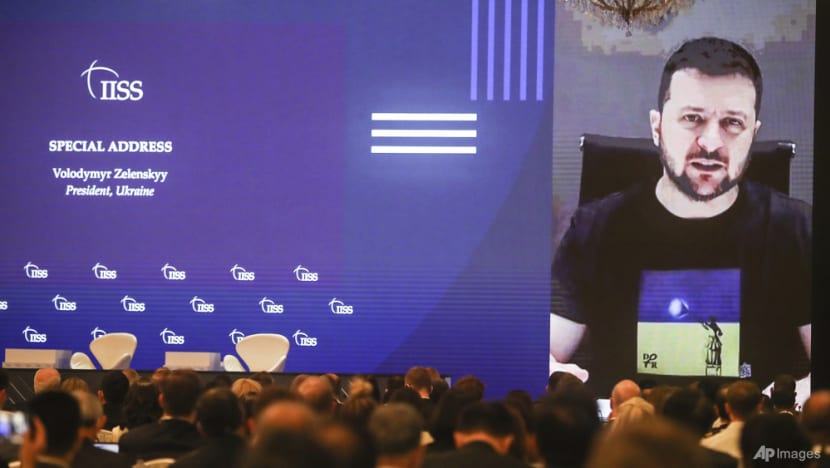Commentary: Are we tired of hearing about Ukraine, like we were with COVID-19?
There’s a real concern that public and political support to end Russia’s invasion of Ukraine will fall as interest in the war dwindles. There are ways to fight the news fatigue, says NTU Centre for Information Integrity and the Internet’s Edson C Tandoc Jr.

Ukraine's President Volodymyr Zelenskyy, right on screen, speaks at a special address via video call during the 19th International Institute for Strategic Studies (IISS) Shangri-la Dialogue, Asia's premier defense forum, in Singapore on Saturday, Jun 11, 2022. (AP Photo/Danial Hakim)
SINGAPORE: Last Monday (Jul 18), Ukraine officials reported six deaths from Russian shelling in the Donbas. On Jul 14, at least 23 people were killed in Vinnytsia. Days earlier, more than 30 were killed after a rocket hit an apartment block in eastern Ukraine.
Five months after Russia started its invasion, attacks and counterattacks rage on but perhaps many of us now give no more than a cursory glance at the headlines. The war dominated headlines initially – and Ukrainian President Volodymyr Zelenskyy became a household name – but public discussion seems to have quietened down.
During the G7 Summit in June, UK Prime Minister Boris Johnson warned about “fatigue” among Western nations in rallying support for Ukraine. This may also be the case with public attention.
It’s a realistic concern when there seems to be no end in sight and matters like inflation, energy supplies and food prices fight for our attention. The worry is that decreased attention may bring down public and political support to end the war.
Social scientists call this “news fatigue” - when we tire of hearing about a particular topic or issue. Studies have found that news fatigue may cause some to actively avoid the news, and this avoidance may impact one’s knowledge, attitude and behaviour toward certain issues.
We don’t have to look far back for an example. In our published study, 19.3 per cent of adult respondents in Singapore reported feeling “tired of hearing about COVID-19” in March 2020, barely two months after the first imported case was reported in Singapore.
This increased to 26 per cent just a month later, when we asked the same respondents the same question in April 2020.
TIRED OF HEARING ABOUT UKRAINE AND COVID-19
What factors increase news fatigue? First, there is information overload—when we are exposed to far too much information than we can thoughtfully process.
At the start, news outlets around the world devoted space and time to report on it. Social media teemed with posts about the war; organisations called for donations; and some companies announced a halt to operations or engagements with Russia.
It exposed the public to information that, at some point, may have been too much for some to think about and process. Indeed, in our COVID-19 information overload study, respondents who experienced high information overload also tend to report higher levels of news fatigue.
Second, misinformation, propaganda and counterpropaganda about the invasion have also spread online. These inaccurate and even manufactured claims added to the confusion, which may have also contributed to the feeling of news fatigue among some people.
Of course, information sources play a role here. Decreased public attention may lead traditional media and social media influencers to lessen their coverage, which contributes to keeping the war out of public consciousness in an unfortunate cycle.
Updates on Ukraine may be overtaken by more recent newsworthy events that home audiences are interested in – domestic politics, costs of living, even record-breaking heatwaves. It becomes a question of how news outlets prioritise space and resources.
This presents an interesting situation: News outlets used to almost exclusively exercise an agenda-setting power. They can influence the issues the public thinks about and considers to be important.
However, with online and social media platforms, individuals can now choose where and when to get information, as well as influence topics of interest for media coverage and discussions online and offline.
ZELENSKYY KEEPS THE WAR IN PUBLIC CONSCIOUSNESS
Zelenskyy, likely attuned to this, has been active online since day one, to help keep Ukraine’s plight in the media and the public agenda.
Many may remember his viral video defiantly declaring “we are here” on the streets of Kyiv to debunk claims he had fled the country. Many videos followed, showing him in his now-signature military colours with world leaders and casualties.
Zelenskyy and his team behind Ukraine’s official social media accounts have taken it upon themselves to prevent the war from fading from public consciousness. They showcase war posters, provide updates on Russian military losses and deftly use memes to advance their narrative.
To keep up coverage in mainstream media, Zelenskyy has addressed many governments, global leader summits, even the Grammy Awards and the Shangri-La Dialogue security conference held in Singapore.
Each time, his message is tailored to his audience. He echoed Winston Churchill when addressing the UK parliament; to the United States Congress, he invoked September 11. At the Shangri-La Dialogue, he quoted Mr Lee Kuan Yew and wore a T-shirt designed by a Singaporean teenager.
He has welcomed Hollywood celebrities, from Sean Penn to Ben Stiller, who is a goodwill ambassador for the United Nations High Commissioner for Refugees.
BEING SELF-AWARE AND FIGHTING NEWS FATIGUE
But even with his best efforts, our attention span is fleeting. We tend to get drawn to what is new or unusual. Lingering issues – the Ukraine invasion, the pandemic – drop from view unless there’s a major development.
But we cannot close our eyes to what is happening. So, in the face of news fatigue, how can we sustain public attention and interest?
First, we need to remind ourselves of why this is important and how it affects not just Russia and Ukraine, but the rest of the world. It must be personally relevant— from how we’ve felt the war’s impact on gas prices and supply chains to Singapore’s interest in upholding international law.
Second, we don’t like feeling helpless so we are drawn to messages about what we can do. Those posting about the ongoing invasion can include information that readers can act on, such as supporting humanitarian efforts like the Singapore Red Cross’ response.
Third, we must be aware of what makes us experience news fatigue. Maybe we’ve signed up for a Telegram group that spams us with unvetted information? Maybe we’re spending more time on social media than usual, overwhelming us with information?
Taking short breaks from these continuous streams of messages may help us refocus our attention to what matters. But taking a break doesn’t mean forgetting.
We must be selective and proactive in seeking out legitimate and authoritative sources on important issues, even if algorithms, influencers or news outlets have already shifted their focus, and not just get information from sources that echo our personal biases. In a period when we have more control of our own information diets, we must also exercise the responsibility of ensuring we do not lose sight of what matters.
Public memory tends to be short. But it shouldn’t be, or else societies continue repeating the same mistakes.
Edson C Tandoc Jr is an Associate Professor and Associate Chair at the NTU Wee Kim Wee School of Communication and Information (WKWSCI) and the Director of the Centre for Information Integrity and the Internet (IN-cube).


















